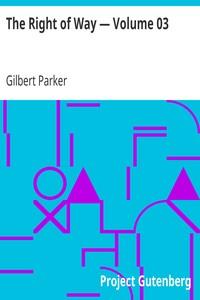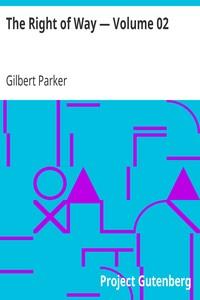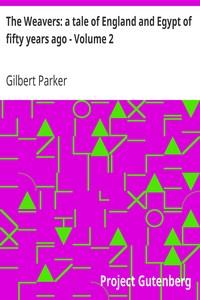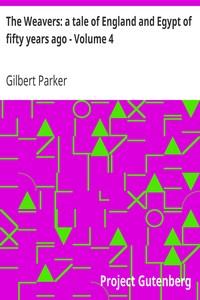Read this ebook for free! No credit card needed, absolutely nothing to pay.
Words: 48441 in 20 pages
This is an ebook sharing website. You can read the uploaded ebooks for free here. No credit cards needed, nothing to pay. If you want to own a digital copy of the ebook, or want to read offline with your favorite ebook-reader, then you can choose to buy and download the ebook.
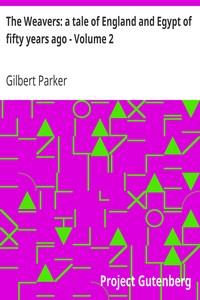

: The Weavers: a tale of England and Egypt of fifty years ago - Volume 2 by Parker Gilbert - Society of Friends Fiction Bestsellers American 1895-1923
Edition: 10
THE WEAVERS
THE WIDER WAY
Some months later the following letter came to David Claridge in Cairo from Faith Claridge in Hamley:
David, I write thee from the village and the land of the people which thou didst once love so well. Does thee love them still? They gave thee sour bread to eat ere thy going, but yet thee didst grind the flour for the baking. Thee didst frighten all who knew thee with thy doings that mad midsummer time. The tavern, the theatre, the cross-roads, and the cockpit--was ever such a day!
Now, Davy, I must tell of a strange thing. But first, a moment. Thee remembers the man Kimber smitten by thee at the public-house on that day? What think thee has happened? He followed to London the lass kissed by thee, and besought her to return and marry him. This she refused at first with anger; but afterwards she said that, if in three years he was of the same mind, and stayed sober and hard- working meanwhile, she would give him an answer, she would consider. Her head was high. She has become maid to a lady of degree, who has well befriended her.
How do I know these things? Even from Jasper Kimber, who, on his return from London, was taken to his bed with fever. Because of the hard blows dealt him by thee, I went to make amends. He welcomed me, and soon opened his whole mind. That mind has generous moments, David, for he took to being thankful for thy knocks.
Now for the strange thing I hinted. After visiting Jasper Kimber at Heddington, as I came back over the hill by the path we all took that day after the Meeting--Ebn Ezra Bey, my father, Elder Fairley, and thee and me--I drew near the chairmaker's but where thee lived alone all those sad months. It was late evening; the sun had set. Yet I felt that I must needs go and lay my hand in love upon the door of the empty hut which had been ever as thee left it. So I came down the little path swiftly, and then round the great rock, and up towards the door. But, as I did so, my heart stood still, for I heard voices. The door was open, but I could see no one. Yet there the voices sounded, one sharp and peevish with anger, the other low and rough. I could not hear what was said. At last, a figure came from the door and went quickly down the hillside. Who, think thee, was it? Even "neighbour Eglington." I knew the walk and the forward thrust of the head. Inside the hut all was still. I drew near with a kind of fear, but yet I came to the door and looked in.
As I looked into the dusk, my limbs trembled under me, for who should be sitting there, a half-finished chair between his knees, but Soolsby the old chair-maker! Yes, it was he. There he sat looking at me with his staring blue eyes and shock of redgrey hair. "Soolsby! Soolsby!" said I, my heart hammering at my breast; for was not Soolsby dead and buried? His eyes stared at me in fright. "Why do you come?" he said in a hoarse whisper. "Is he dead, then? Has harm come to him?"
Here are thy words, Davy. What think thee of them now?
"As I dwell in this house I know Soolsby as I never knew him when he lived, and though, up here, I spent many an hour with him. Men leave their impressions on all around them. The walls which have felt their look and their breath, the floor which has taken their footsteps, the chairs in which they have sat, have something of their presence. I feel Soolsby here at times so sharply that it would seem he came again and was in this room, though he is dead and gone. I ask him how it came he lived here alone; how it came that he made chairs, he, with brains enough to build great houses or great bridges; how it was that drink and he were such friends; and how he, a Catholic, lived here among us Quakers, so singular, uncompanionable, and severe. I think it true, and sadly true, that a man with a vice which he is able to satisfy easily and habitually, even as another satisfies a virtue, may give up the wider actions of the world and the possibilities of his life for the pleasure which his one vice gives him, and neither miss nor desire those greater chances of virtue or ambition which he has lost. The simplicity of a vice may be as real as the simplicity of a virtue."
Ah, David, David, I know not what to think of those strange words; but old Soolsby seemed well to understand thee, and he called thee "a first-best gentleman." Is my story long? Well, it was so strange, and it fixed itself upon my mind so deeply, and thy writings at the hut have been so much in my hands and in my mind, that I have put it all down here. When I asked Soolsby how it came he had been rumoured dead, he said that he himself had been the cause of it; but for what purpose he would not say, save that he was going a long voyage, and had made up his mind to return no more. "I had a friend," he said, "and I was set to go and see that friend again. . . . But the years go on, and friends have an end. Life spills faster than the years," he said. And he would say no more, but would walk with me even to my father's door. "May the Blessed Virgin and all the Saints be with you," he said at parting, "if you will have a blessing from them. And tell him who is beyond and away in Egypt that old Soolsby's busy making a chair for him to sit in when the scarlet cloth is spread, and the East and West come to salaam before him. Tell him the old man says his fluting will be heard."
Free books android app tbrJar TBR JAR Read Free books online gutenberg
More posts by @FreeBooks
